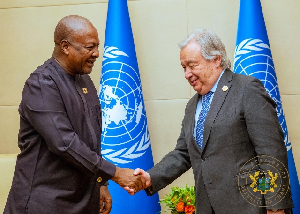Foreign Direct Investment (FDI) has seen a consistent drop in five years, by 65.85percent, since peaking at US$6.3billion in 2011, while the value of registered local businesses has, encouragingly, been on the rise.
According to data from the Ghana Investment Promotion Centre (GIPC), between 2011 and 2015, the value of FDI has dropped from US$6.3billion to US$2.3billion, worsening to US$1.9billion in the first three quarters of 2016.
Local investment, on the other hand, has increased by a whopping 1,033.2percent from US$829.5million in 2013 to US$9.4billion in 2015.
Explaining the FDI drop to the B&FT, Mawuena Trebarh, CEO of the GIPC, said FDI inflows on a global scale have struggled to recover since the global economic and financial crisis of 2008.
“This trend is, therefore, not specific to Ghana and it is not isolated from the global economy,” she said, adding that the GIPC, itself, has become careful and is focusing on quality investments and not merely shoring up the numbers.
“If we can demonstrate that this investment can create a certain number of jobs and will be able to transfer this kind of technology, then we will push that agenda and make recommendations for incentives, because we can prove that within a certain time frame, it is not just tax revenue, but ancillary jobs, that will be created,” she said.
“It is important to note that Ghana, today, is significantly different from what Ghana was two decades ago, and that is why our legislation has had to change to meet the requirement of the new economic era in which we find ourselves.
We must promote investments that will create development, which include jobs and new technologies. If we do not look at investment promotion in that context, then we will look at hard numbers and we can’t tie in the development requirements,” she added.
Two sectors the GIPC has strategically attracted investments in are manufacturing and tourism, Mawuena Trebarh explained.
Some major investments attracted included Ciments De L’Afrique Ghana, a cement plant at Tema valued at US$75million and expected to create 1,200 jobs; and Wangkang Ghana Ceramics Limited, a ceramics floor and wall tiles manufacturing company at Eshiem in Sekondi-Takoradi, valued at US$93.6million, with about 2,000 jobs to be created.
Twyford Ceramics Co. Ltd is also in with US$77.26million investment, to manufacture ceramic floor tiles at Aboadze in the Western Region, and to create an expected 1,700 jobs.
The GIPC also sees the entry of Perennial Ghana Development Limited (Shangri La), as a strategic one. The US$506million investment is a development of a mix use facility, with a 5-star hotel, serviced luxury apartments, offices, and a retail mall in Accra, expected to create about 15,312 jobs.
Another worthy FDI the GIPC mentions is the US$59.45million Hilton Garden Inn at Airport City, by Independent Properties Limited, expected to create 414 jobs.
“Looking at what is required to build a strong tourism investment promotion initiative, if we do not have appropriate hospitality facilities it will be difficult to attract investors,” Mawuena Trebarh said. “Tourism is a big opportunity area for us and a huge place to create jobs.”
According to the UNCTAD Investment Report, West Africa’s FDI inflows have been dwindling, from a high of US$16.8billion in 2012, to a low of US$9.9billion in 2015.
Globally, according to the same report, FDI has seen a consistent decline from US$1.5trillion in 2011 to US$1.3trillion in 2014, before rising marginally to US$1.8trillion in 2015.
Business News of Friday, 20 January 2017
Source: B&FT













